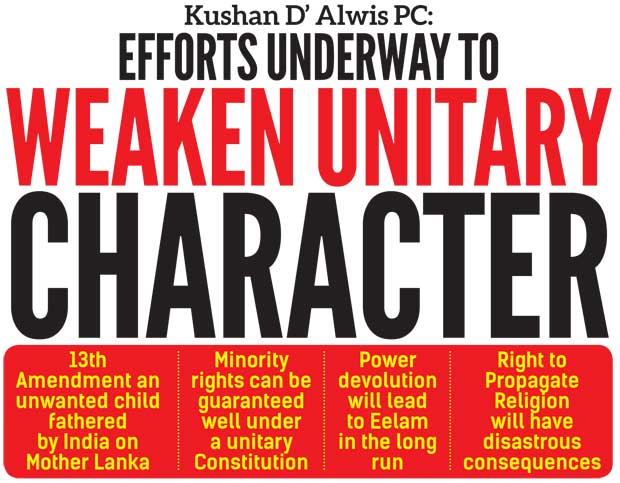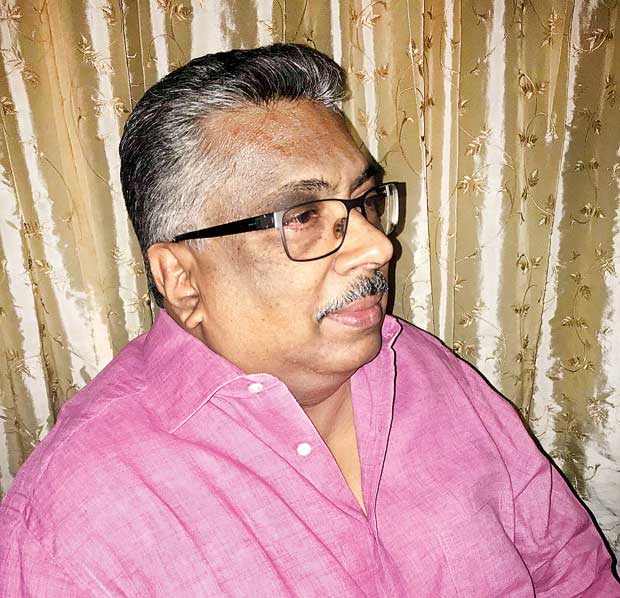Reply To:
Name - Reply Comment
Last Updated : 2024-04-26 10:47:00

President’s Counsel Kushan D’ Alwis, who served the Public Representation Committee that deliberated with people on Constitution making, says there is lack of transparency in the whole Constitution making process. In an interview with Daily Mirror, he says strong unitary features are needed in the Constitution. Excerpts;

What I witness at the moment is lack of transparency. Why I say so is because we, the Public Representation Committee, gave certain recommendations regarding the presidential system, the electoral system and so forth. Unfortunately, the sub-committee reports do not touch on either. These two are very crucial in my mind to any Constitution-making process. What is the future of the presidential system? The sub-committee report does not touch on it. Next, the electoral system is also not looked at. It is a part of the present Constitution. These two are vital elements to be  considered, and according to my understanding, there is lack of transparency. In the Public Representation Committee report, as you see, there are recommendations which are quite contrary to each other on each subject. If you go through it, you would find the proposals contradicting each other on matters like the national flag, religion and power devolution. There is no need for anyone to pen a second report. You would, sometimes, find five different recommendations on a single subject matter. One cannot settle on any conclusion by going through the Public Representation Committee report as to what the Constitution would look like in the end.
considered, and according to my understanding, there is lack of transparency. In the Public Representation Committee report, as you see, there are recommendations which are quite contrary to each other on each subject. If you go through it, you would find the proposals contradicting each other on matters like the national flag, religion and power devolution. There is no need for anyone to pen a second report. You would, sometimes, find five different recommendations on a single subject matter. One cannot settle on any conclusion by going through the Public Representation Committee report as to what the Constitution would look like in the end.
It is like this. The presidential system, coupled with the provincial council system and devolution of powers, plays a vital role. That is for the reason that it is the President, through the governors appointed by him, who controls the activities of provincial councils. The parliament has nothing to do here.
It looks like the government is attempting to give more powers to the periphery.
Then, if one is to knock off the presidential system, there will have to be alternative safeguards for it. Otherwise, there can be absolute chaos.
I do not agree with it. I say the 13th Amendment is the unwanted child fathered forcibly by India on Mother Lanka. Moreover, we all know how the 13th Amendment was passed in Parliament, how the MPs were brought in to Parliament and how they voted. It is something which the country was basically forced to swallow. There was no demand from the country, barring the North and East, for devolution of power. Therefore, I feel that the solution to this issue is not devolution of power in the manner now being tried upon. It could be worked out more administratively. Of course, every Sinhalese, Tamil and Muslim has a right to every inch of the country. Be it in Jaffna or Matara, everyone has a right. There must be absolute freedom for every citizen to be able to transact his or her day-to-day work in their mother tongue. I am talking particularly about the Sinhala and Tamil languages. I would say a Tamil must be able to transact his or her business in Tamil in Matara. We must bring it up to that level. Also, if there are issues about university admission and similar concerns, all have to be looked into. But, in this small nation, I do not believe that the creation of a Federal state or something akin would be the best answer. It can have very dangerous consequences.
Yes. One can see from the reports of the sub-committees that there is a move to weaken the power of the centre and strengthen the provincial councils along with land and police powers. Then, although it is unitary in name, it will amount to be a de facto Federal state.
In that dissenting judgment, the thing is that, as it stood at that moment, there were police and land powers outlined in the Bill presented. However, even during the times of the then President the late J.R. Jayewardene, the late R. Premadasa and former President Chandrika Bandaranaike Kumaratunga, land and police powers were not given. Therefore, there would have been some good reasons for it. Ms. Kumaratunga, during her 11 years, even did not take any step in this regard. The 13th Amendment was already in place. There is no need for two-thirds in Parliament to do it. When those four judges looked at it in this manner, it sounded almost a de facto Federal state. The central government, having realised the dangers involved and due to certain judgments, did not give land and police powers. Now, there are attempts to weaken the centre as shown in the proposals for new Constitution-making.
I consider it to be very serious. I say it with reasons. One is the fact that none of the present Northern political leaders has condemned Prabhakaran. They have not said Prabhakaran did not represent the views of Tamil people. If they say so, they would lose their political bases in those areas. In turn, it means the population believes in it; a worst scenario. In that mindset, one has to take into consideration the fact that there are 77 million people in Tamil Nadu which is in close proximity to Sri Lanka. As long as there is a strong central government in India, the Eelam dream will be unrealistic there. However, maybe 75 or 100 years later, if there is any weakening of the central government of India, disintegration will be inevitable. The Eelam concept will definitely come into play. If there is a de facto Federal state, it will fall short of only one step behind a separate state. One has to think far. As long as India is united with a strong central government, it will be impossible in that country.
What I feel is that there must be economic development of the country right across. If there is development in the North and East and rest of the country, higher education standards and facilities, then the clamour for Eelam will diminish. Constitutionally, one has to ensure that every citizen has equal rights everywhere in the country. I am totally against devolution of power based on ethnicities, and I have specifically mentioned that in this report.
It would be ideal to strengthen it further. At least now we must put in some effort to stop further damage being done. There are a lot of players involved here. Now, there is the so-called international community. All of them push for more devolution of power. If we can stop it at least, that will be a great achievement. Certainly, it will be a bonus if we can strengthen the Constitution. At the moment, I do not think that can be achieved.
Of course, they can be brought into decision-making processes by assigning Cabinet responsibilities to their representatives. One can look into various systems within the framework of the central government. It is possible under the unitary character. Today, the Muslim and upcountry Tamils are represented in the Cabinet. The Northern Tamil political leaders have decided to stay away from Cabinet responsibilities.
When looking at the sub-committee reports, I do not think the government will touch on this point. But, what is proposed is to weaken this particular clause on Buddhism in another way by expanding the scope of fundamental rights. Under fundamental rights on religion, the right to propagate has been given. One should have the liberty to preach religion. That is one. Propagation is another.
According to the sub-committee report on Fundamental Rights, the freedom to manifest religion is there. You could manifest the religion of person in worship, observance and practice. These are not issues. The issue is propagation. Even teaching religion is not an issue. Propagation can lead to a lot of abuse because it can be done in many ways. Then, there is a watchdog to look after all these aspects.
It is practically impossible. It will create dissension among the religions. Some religious sects with fundamentalist agendas and backed by some foreign countries can create issues in the guise of propagation. I strongly feel that the word ‘propagation’ should not be included.
The 2000 Bill, for instance, sought to take off the unitary status. I do not think it should be touched. That too, I believe, will not be touched in words. But, by the subsequent devolution of power, the entire meaning of the word ‘unitary’ will be brought to nil.
In my view, the government will try to work out the new Constitution. Whatever it is, it should be presented to the approval of the people by referendum. The Supreme Court has to decide whether it should be a referendum or not.
While some articles or clauses may need two-thirds approval as well as a referendum, some others may not. It is ultimately the Supreme Court that will have make the call.

Add comment
Comments will be edited (grammar, spelling and slang) and authorized at the discretion of Daily Mirror online. The website also has the right not to publish selected comments.
Reply To:
Name - Reply Comment
US authorities are currently reviewing the manifest of every cargo aboard MV
On March 26, a couple arriving from Thailand was arrested with 88 live animal
According to villagers from Naula-Moragolla out of 105 families 80 can afford
Is the situation in Sri Lanka so grim that locals harbour hope that they coul